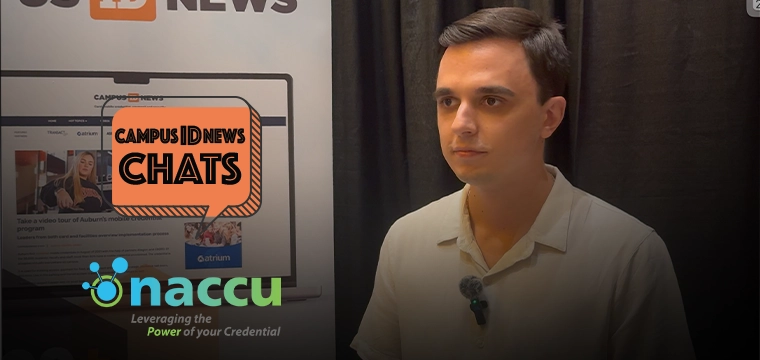 A panel of ID industry experts provided predictions for 2005. One of these glimpses into the future will appear here each day during December.
A panel of ID industry experts provided predictions for 2005. One of these glimpses into the future will appear here each day during December.
by Bob Huber, President, Robert Huber Associates
Prediction #1 – Off-Campus Merchants
In just five years (2010), 50% of all campus card systems will include at least several off-campus merchant applications; Off-campus “marketing partners” will surpass all banking relationships within three years, secondly only to “self-op” management of off-campus merchant applications.
Prediction #2 – IP Readers
Individual “IP-addressable” card readers will compose 90% of card system vendor reader sales within two years, as institutions move away from traditional dedicated networks to connect readers to host systems.
Prediction #3 – Smart Cards Lose
Smart cards have lost their “window of opportunity” for acceptance in the U.S. due to fledgling promises and failed pilots over the past 20 years, and will be surpassed by more customer friendly technologies (i.e. magnetic stripes, biometrics, etc.).
Prediction #4 – Magnetic Stripe Reigns
Nearly 90% of campus cards will still retain a magnetic stripe in the next five years, while bar codes will quickly disappear off campus cards.
Prediction #5 – Proximity
The family of proximity technologies will continue to “seduce” many campuses with their single application and often expensive proprietary technology (i.e. usually only in security applications), and will compose the secondary technology on many “combi” campus cards.
Prediction #6 – Web Tools
Demand for increased customer services, more restrictive budgets, and higher debit account deposits will drive the acquisition of third-party web tools to accept financial deposits via the Internet by both students and their families, and therefore transitioning the traditional card office into a Virtual Customer Service Center.
Prediction #7 – Hosting Evolves
Although the majority of schools in the past have dedicated one card system host per campus, there will be an increased variety of host options and configurations (i.e. satellite/regional campus sharing, neighboring institution sharing, business/institution sharing, centralized vendor host leasing, etc.).
Prediction #8 – Vendor Partnerships
Vendors in the campus card industry will form more alliances with each other for expertise, integration, and demand by expansive All-Campus Card programs, both on and off campus.
Prediction #9 – Door Access Communications
If industry security and communication issues are rectified, “wireless” door access readers (on-line) will eventually secure 25% of the market, while off-line door access readers (standalone) will retain 50%, and the remaining 25% will utilize on-line communications (wired).
Prediction #10 – Pay-for-Print
Increased attention to printing consumable costs will eliminate free printing, necessitate central control and management of computer labs, and integration of Pay-for-Print subsystems linked (debited) to the campus card system.
“What’s Hot and What’s Not”
HOT —– COLD
Biometrics —– Smart Cards
Wireless Readers —– Off-Line Readers
IP Card Readers —– Private Networks
Shared System Hosts —– Single System Host
Off-Campus Applications —– On-Campus Applications
Marketing Partners —– Exclusive Banks
Pay-for-Print —– Copy Machines
Deposits (via Web) —– Deposits (via USPS)
Virtual Service Centers —– ID Offices
Strategic Marketing —– Periodic Promotions
About the author:
Mr. Robert Huber is President of Robert Huber Associates, a “vendor independent” management consultancy, based in Scottsdale, Arizona. His firm specializes in assisting colleges, universities, community colleges, boarding schools, healthcare facilities, and corporations with campus card programs.
He earned a Bachelor of Science degree (B.S.) in Business Administration, an Associate of Science degree (A.S.) in Restaurant Management, and has been certified by the Arizona Department of Education, the Arizona Community College Board, the Institute of Management Consultants, and the National Bureau of Certified Consultants.
Mr. Huber has an extensive management, operations, and marketing background. During the past 35 years, he implemented over 200 management systems – including point-of-sale, debit, food service, meal plan, vending, door access, mainframe, and food production systems. In addition, he was responsible for the startup and management of 50 Burger King ® restaurants, 3 hotels, 2 campus radio stations, and has trained over 2,000 employees.
Mr. Huber has been a pioneer in the development and implementation of campus card programs for over 20 years. In 1985, he co-developed and implemented the first campus-wide multi-application card system at Duke University, providing students with pre-approved access to hundreds of services – using a single card. During his career in higher education, he has worked with over 150 colleges and universities throughout the United States and Canada.
Mr. Huber has no financial ties with any vendors (e.g. card system, banks, credit unions, or financial consortiums) and does not recommend specific companies or systems. Instead, he educates and guides his clients through strategic processes and provides impartial professional advice so they may better define and more efficiently achieve their organizational goals.
Robert Huber, C.M.C., C.P.C.M., is an author, media resource, industry analyst, and frequent speaker at industry meetings, workshops, and conferences.
Visit Robert Huber Associates on the web at www.allcampuscard.com.




